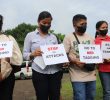
4 ‘O CLOCK HABIT. City Health Officer Dr. Josephine Villafuerte says one Davao City resident was confirmed to have contracted the Japanese encephalitis and encourages the public to do the 4 o’clock habit everyday, and destroy all possible breeding areas of mosquitoes. (Paulo C. Rizal/davaotoday.com)
By Janika Mia Tiempo, MSU Intern
DAVAO CITY — The City Health Office has confirmed a case of Japanese encephalitis in Davao and warned the public of the viral disease transmitted by mosquitoes which can cause neurologic defects.
Dr. Josephine Villafuerte of CHO here confirmed that a 52-year-old man from Bacaca was diagnosed with Japanese encephalitis, a mosquito-borne flavivirus related to dengue, yellow fever and West Nile viruses. He was discharged from the hospital last week.
The patient now suffers from neurologic diseases, including memory lapses, as a result of the virus. Villafuerte said only a few fully recovers from the disease.
Villafuerte warned that aside from dengue, the public should also be cautious of the viral Japanese encephalitis carried by Culex mosquitoes.
She added that the mosquito that bit the patient could fly 30 to 50-meter radius and could bite another person again.
Villafuerte said that the patient was exposed five to fifteen days ago here in the city but was not reported immediately.
“You should not be so complacent that there is just one case. We have to take into consideration that we have a lot of mosquito-borne illness, we have dengue, we have filarial, we have Japanese encephalitis, we have other illnesses also,” she said.
In a study by the World Health Organization (WHO), the Japanese encephalitis is characterized by rapid onset of high fever, headaches, neck stiffness, disorientation, coma, seizure, spastic paralysis and ultimately death.
“It could present manifestation of stroke because the patient will have neurologic deficit, but if we look on to his history and sample, you will know that it’s not stroke but a virus called Japanese encephalitis,” Villafuerte said.
As for comparison, Villafuerte clarified that lower level of platelet like in dengue case is not the basis of knowing if a person suffers from Japanese encephalitis.
The key facts presented by Villafuerte stated that there is no cure for the disease.
“The treatment is focused on relieving severe clinical signs and supporting the patient to overcome the infection,” the WHO said.
Research shows that there is an estimate of 68,000 clinical cases of JEV in many countries of Asia every year.
‘Observe the 4 o’clock habit’
Villafuerte said that observing the 4 o’clock habit is important to prevent the breeding of mosquitoes.
“It’s a viral, it’s symptomatic, we really have to implement the 4 o’clock habit so the mosquito could not lay their eggs,” she said.
She said the surroundings should be kept dry and clean, including refrigerators, dishwashers, water dispensers and air conditioning units.
Villafuerte said they are checking whether there are still other cases in other vicinity.
“So far, in two weeks no new case has been reported,” she said. (davaotoday.com)










